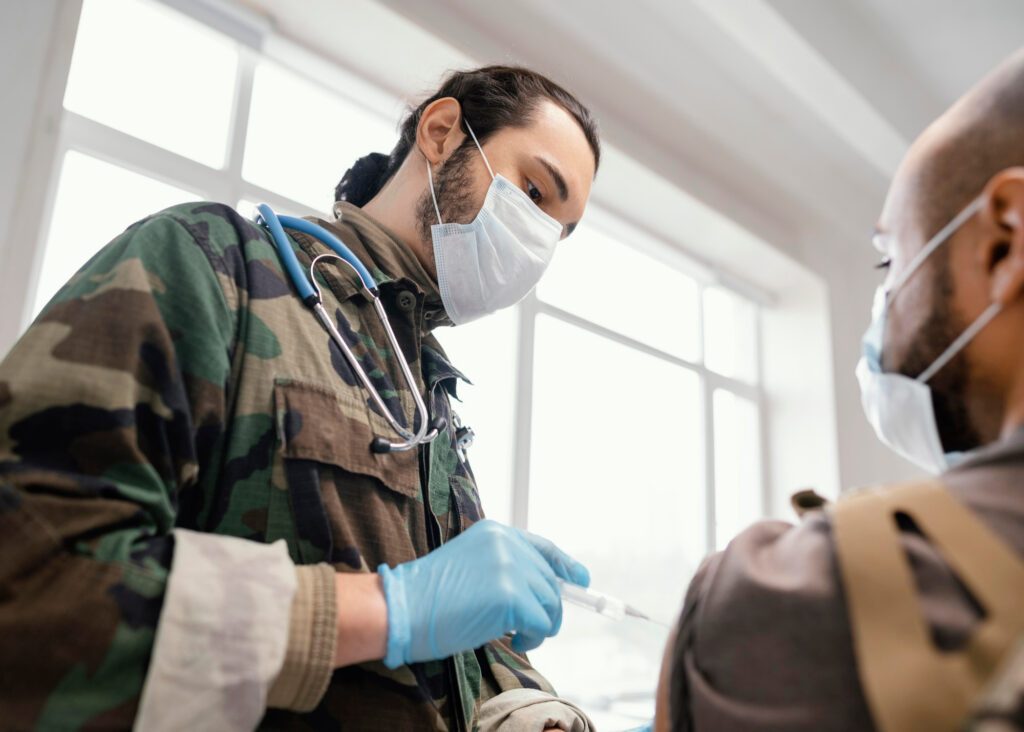Through conversations with many medical students and doctors, the opportunity of joining the army as a medical officer is something many are unfortunately unaware of. This page will give you everything you need to know about the prospect of serving the armed forces by being a doctor!🌟
🤔 What is it
An Army Doctor life is incredibly diverse, from treating casualties on the front line to caring for soldiers in barracks or providing medical support at Army sports events. In the first few years, you’ll likely serve as a Regimental Medical Officer with a combat unit or as a General Duties Medical Officer with a medical regiment. You’ll receive exceptional training to prepare you for the unique injuries and illnesses encountered in military life. Along the way, you’ll have opportunities to gain new qualifications, gain valuable experiences, and participate in sports and adventure training. It’s a career unlike any civilian role.
The Royal Army Medical Corps (RAMC) is responsible for safeguarding the health of servicemen and women. Its personnel are present wherever British Soldiers are deployed, offering medical support during operations, exercises, and adventure training missions worldwide🌍.
🩺Available Medical Specialities and Qualifications you can get in the Army:
- 👨⚕️ GP
- 🚨 Emergency Medicine
- 💉 Anaesthetics and Resuscitation
- 🩹 Surgery – Orthopaedics, General, Burns, Plastics
- 🏥 General Medicine
- 🧠 Psychiatry
- 🔬 Pathology – Microbiology or Haematology
- 🩻 Radiology
- 💪 Rheumatology and Rehabilitation
- 🛠️ Occupational Medicine including Aviation Medicine
- 🌡️ Public Health
🏋️♂️The Process
1. Start your application here and after several months you will be called to do health and fitness tests. If you’re in medical school, apply for the Army Medical Services Bursary.
2. Prepare for AOSB (Army Officer Selection Board) “Briefing” and “Main Board” (MTM’s Tips Below!)
3. 📝 Do AOSB Briefing:
- Can be completed during or post medical school.
- Initial stage, designed to introduce candidates to the selection process and provide an overview of what’s expected
- Includes preliminary physical assessments, cognitive tests, and leadership exercises.
- At the end of the briefing, candidates receive a recommendation on whether to proceed to the Main Board and advice on areas needing improvement.
4. 📝Do AOSB Main Board:
- Final and more intensive stage, lasting several days.
- Candidates undergo a series of challenging tasks, including physical tests, group planning exercises, individual problem-solving tasks, leadership scenarios, and a final interview.
- Includes preliminary physical assessments, cognitive tests, and leadership exercises.
- The Main Board is designed to rigorously assess candidates’ leadership qualities, resilience, and suitability to become British Army officers.
If successful you are awarded a place on the Commissioning Course Short at the Royal Military Academy, Sandhurst!
5. 🏥 Complete F1 and F2 at one of the Defence Medical Group Units.
- Frimley Park
- Northallerton
- Portsmouth
- Plymouth
- Queen Elizabeth Hospital Birmingham
6. 🎖️Complete the 10-week course at Sandhurst from October to December following F2 to earn the Professionally Qualified Officer (PQO) certification. This training covers essential military, survival, and weapon-handling skills. After completion, you will be commissioned into the Army Medical Services.
7. 🎖️Phase 2 – Entry Officers Course and Postgraduate Medical Officers Course (PGMO) runs from January to May. This 14-week Army Medical Services Entry Officers’ Course provides essential medical skills that go beyond typical medical school training:
- Battlefield trauma
- Major incident planning
- CBRN (chemical, biological, radiological, nuclear) medicine
- Tropical medicine
- Diploma in Medical Care in Catastrophes.
Upon completing the PGMO course, you are promoted to Captain.
8. 👨⚕️You become a GDMO (General Duties Medical Officer):
- This posting is for 3 years after FY Training
- This is a non-training position – note this one of the disadvantages of the career as you will likely be ~3 years behind speciality training relative to your NHS colleagues.
- You’ll be posted to a Medical Regiment, which will handle your administration and decide deployment details with oversight from a senior GP, who will also provide support. While in the UK, you’ll be attached to a medical center.
9. 🏥 After your time as a GDMO you choose to train/specialise in the Army (limited choices, see above) or leave the Army back to the NHS.
- If you choose to specialise in secondary care – it is generally based in the UK (NHS hospitals). There are opportunities to deploy but they are becoming rarer and rarer for secondary care army doctors.
- If you choose to become a GP (RMO – Regimental Medical Officer) – you do the lions share of deployed activity. As an RMO you could expect to be overseas 3-6 months of every year in ~4 countries.
💷 Financial Benefits
Yeah you heard us right earlier, the army do treat you financially. The salary is highly competitive, with subsidized housing, significant fuel allowances, and a wide range of Army-provided courses.
👩⚕️For Medical Students:
- The full £75,000 bursary is available to candidates who will graduate with an Army-endorsed medical degree and intend to join the Royal Army Medical Corps (RAMC) for a minimum period of 4 years as a commissioned Medical Officer (starting after FY2)
- Apply no later than your second year to qualify for the full amount of bursary
- The financial aid is paid in annual instalments of £10,000 during your final 3 years of university then a lump sum of £45,000 on successful completion of Officer training.
- If you apply at Medical School but later – maybe in your 4th/5th year, then you are still entitled to £10,000/year for your remaining years of study.
- Also depending on if you are in the reserves or UOTC, you may be eligible for your elective to be funded by the army!
- Bursary Eligibility: You must be aged between 18-39. Apply by the end of January, while you’re still at university.
🎓For Doctors:
- If you apply as a direct entrant (joining the army after FY2) then you do not receive the above. If you choose this route we recommend applying at the start of FY1 as the application process can take up to a year and you need to allow for delays (for instance you have something on your medical record they need more info about)
You will also be paid an Army salary during your two years of foundation period employment
📈Once you have completed your military training, you will be on a minimum salary of £70,928. This will go up once you’re fully qualified!
🏄♂️The Lifestyle
You’ll need some flexibility with location, but if that’s not a problem, there are plenty of perks.
- If you have a UK-based role: it is generally 0800-1630, Monday to Friday. No weekends, no on-calls, and no night shifts. Enjoy generous breaks for coffee and lunch, with around 20+ minutes per patient (varies). Fridays are often short, and there may be occasional afternoons off for recreational activities.
- 🗺️ For International placements: These vary, though they’re typically less intense, but you’ll often be on standby. There’s usually a chance to explore the country—whether it’s free weekends or adventure training packages organised by the Army at the end of exercises.
- 🌴 Leave: Annual leave is generous! There’s around 38 days, plus extra leave if you’re deployed, relocated, or sometimes additional days granted to the whole unit.
- ⚽ Sports and Hobbies: If you’re into sports or hobbies, there are plenty of opportunities to participate. For instance, I’ve gone skiing with the Army several times in the past couple of years.
- 🌍 Travel Opportunities: The travel is a major benefit. A military doctor recounts that just in the last year he was able to travel to Oman, France, Holland, Brunei/Borneo (with personal travel to nearby Malaysia), and parts of Africa.
✅ What’s in it for you
- Provide frontline medical support at every level of care – work in challenging and varied environments.
- The ability to receive up to £75,000 in Student Bursary (explained above!)
- Enjoy a very generous salary, where many aspects of your life will be subsided and sponsored.
- Enjoy opportunities for postgraduate training
- Enjoy a wide range of sports, an excellent social life, the ability to travel the world whilst working!
❌ Potential Downsides to Joining the Army
- May not be able to train in your speciality of choice
- Can be hard to spend time away from family, friends, and significant others
- Due to the nature of the army, there Is always a risk of potential danger to yourself however you’ll rarely ever be on the “front lines” in situations of true danger
- Restricted freedom of choice in deployment, role and aspects surrounding this.
- Commitment: Serve in the army for at least 4 years as a doctor once you qualify, including training.
- 3 years GDMO ‘out of training’ between FY2 and starting specialty training.
🏆 MTM’s Top Tips for passing AOSB + Interviews
- If you’re interested in joining the Army – START EARLY! The process can be slightly long so do get the ball rolling early.
- Utilise your local University Officer Training Corps (UOTC) for advice
- Use the “ArmyFit” app to prep for fitness at AOSB
- For the “debate” part of your AOSB – stay up to date with current affairs from the past 6 months (UK/Global, politics, business climate). Applicants have recommended TheWeek, BBC GlobalNewsPodcast, Bloomberg, Reuters, Al Jazeera, The Economist.
- Immerse yourself in the Army – research and understand the roles it plays, its history, its structure, differing regiments, the equipment it uses, ranks and the roles and responsibilities of an Officer. Learn about the different regiments, the role they play and their history.
- Research common interview questions, be ready to be grilled on everything you have written on your application and anything you have done in your life.
- Stay calm, be positive, sleep well, and eat well during AOSB – be CONFIDENT and BE YOURSELF
- Practice planning exercises (use this link to download example exercises)
- Practice for your Mental Aptitude Tests
- Watch this video on possible interview questions and answers here.
Remember, Churchill only became an officer on his 3rd attempt – never give up!
📋 Requirements:
- Age: From 17 years & 9 months to 36 years & 11 months
- Qualifications: Be studying a Degree in Medicine. Full registration with the UK General Medical Council (GMC), you could also be at the point of completing your medical training. An Army doctor pursuing specialist training in general practice or a hospital specialty must meet the Royal College’s requirements to obtain the Certificate of Completion of Specialist Training. Specialists can apply up to the age of 55
- Basic physical fitness assessment:
- Mid Thigh Pull 50kg
- Medicine Ball Throw 2.7m
- MSFT (beep test) level 5.8
- Eye sight: You can definately join the army if you wear glasses. Your eyesight should be no worse than -6/+6. If yours is worse, it’s still worth applying.
🧠 Mental Aptitude Tests Info
- Practice logical reasoning aptitude tests, numerical/abstract reasoning (used in cognitive and personality assessments in AOSB)
- Use https://www.militaryaptitudetests.org/ or UCAT questions – very similiar style to army mental aptitude tests
- Thoroughly practice speed, distance and time calculations. Improve mathematical agility (numerical reasoning test, 1 of the interviews, planning exercise)
- Verbal reasoning – 40 questions in 15 mins
- Numerical reasoning – most important of the MAP tests – 36 questions in 15 mins – prep hard.
- Abstract Reasoning– 70 questions in 12 minutes.
📚 Further reading:
Some interesting reads to build your army knowledge and to see if the life suits you:
- Post Capitalism: A Guide to Our Future – Paul Mason
- Who Rules the World? – Noam Chomsky
- Turn the Ship Around! A True Story of Turning Followers Into Leaders – L. David Marquet
- Leadership is just plain you – Field Marshal Slim.
- The Art of War – Sun Tzu
- Leadership – Learning From Great Leaders – John Adair
- No Mean Soldier – Peter McAleese
- 18 Platoon – Sydney Jary
- Soldier – General Sir Mike Jackson
- Oxford History of the British Army – David Chandler
- The British Officer- leading the Army from 1660 to the present – Anthony Clayton
- Acts of War: the behaviour of men in battle – Richard Holmes
- Encyclopedia of modern British Army Regiments – P.D. Griffin
- Rain – Barney Campbell
- Armageddon – Max Hastings
- Histories of Nations – Peter Furtado
- No Way Out: The Searing True Story of Men Under Siege – Adam Jowett – James Goodson
- Soldier in the Sand: A Personal History of the Modern Middle East
ℹ️ Further info:
🔗 Useful resources:
💬 Verbal Reasoning
- https://www.assessmentday.co.uk/aptitudetests_verbal.htm
- https://www.shl.com/shldirect/en/assessment-advice/example-questions/verbal-reasoning
- https://www.jobtestprep.co.uk/free-verbal-reasoning-test
- https://www.verbalreasoningtest.org/
- https://www.graduatesfirst.com/verbal-reasoning/
- https://www.education.vic.gov.au/Documents/school/parents/secondary/verbalreasoningpractice.pdf
- https://psychometrictests.uk/verbal-reasoning-test/
- https://www.youtube.com/watch?v=5jSGrPz-5tQ&ab_channel=AssessmentCentreHQ
- https://www.youtube.com/watch?v=JpMo-LyuWzs&ab_channel=GradTests
- https://www.youtube.com/watch?v=ywIDqVteoMk&ab_channel=Journey2Med
🔢 Numerical Reasoning
- https://www.youtube.com/watch?v=d8TBUX8SmCU&ab_channel=AssessmentCentreHQ
- https://www.youtube.com/watch?v=lTA_5pxH0Sc&ab_channel=NumericalReasoningTutor
- https://www.youtube.com/watch?v=G8z0NzeeV54&ab_channel=OnlineTrainingforEveryone
- https://www.youtube.com/watch?v=Aij2QDr6K7A&ab_channel=DanCroitor
- https://www.youtube.com/watch?v=8YgsnIrYDkQ&ab_channel=GradTests
- https://www.youtube.com/watch?v=POi5xL2hIlY&ab_channel=OnlineTrainingforEveryone
- http://www.graduatewings.co.uk/numerical-reasoning/
- https://practice.cappassessments.com/Nrt/NrtPage.html
- https://www.kent.ac.uk/ces/tests/mathstest.html
- https://www.gov.uk/guidance/preparing-for-the-civil-service-verbal-and-numerical-tests#practice-tests
- https://greenturn.co.uk/KPMG-Numerical-Reasoning-Test-Guidance-Download.html
🧩 Abstract Reasoning
- https://www.youtube.com/watch?v=3DS-SMbt8-U&ab_channel=KharmaMedic
- https://www.youtube.com/watch?v=S65OFLWHUQA&ab_channel=SenKath
- https://www.youtube.com/watch?v=Hco3mfc7tP4&ab_channel=RainaOnTheCusp
- https://www.youtube.com/watch?v=M2rQT7zW5Uo&ab_channel=KharmaMedic
- https://www.youtube.com/watch?v=qZ6L6owubOU&ab_channel=MichaelRman
- https://www.nibcode.com/en/psychometric-training/abstract-reasoning-test
- https://www.psychometricinstitute.co.uk/Free-Aptitude-Tests.asp
- https://www.latestpilotjobs.com/webgame/free/id/38
- https://rankyourbrain.com/iq-games/18/abstract-reasoning
- https://static1.squarespace.com/static/5ba0ed034611a036e7513ee4/t/5f76fdd019d6bd453d35d791/1601633744849/Psychometric%2BSuccess%2BAbstract%2BReasoning%2B-%2BPractice%2BTest%2B1.pdf
- https://www.medentry.co.uk/resources/ucat/guide/abstract-reasoning
- https://www.youtube.com/results?search_query=abstract+reasoning+sponcs
We hope you found this article informative and helpful! Let us know in the comments!






One Response